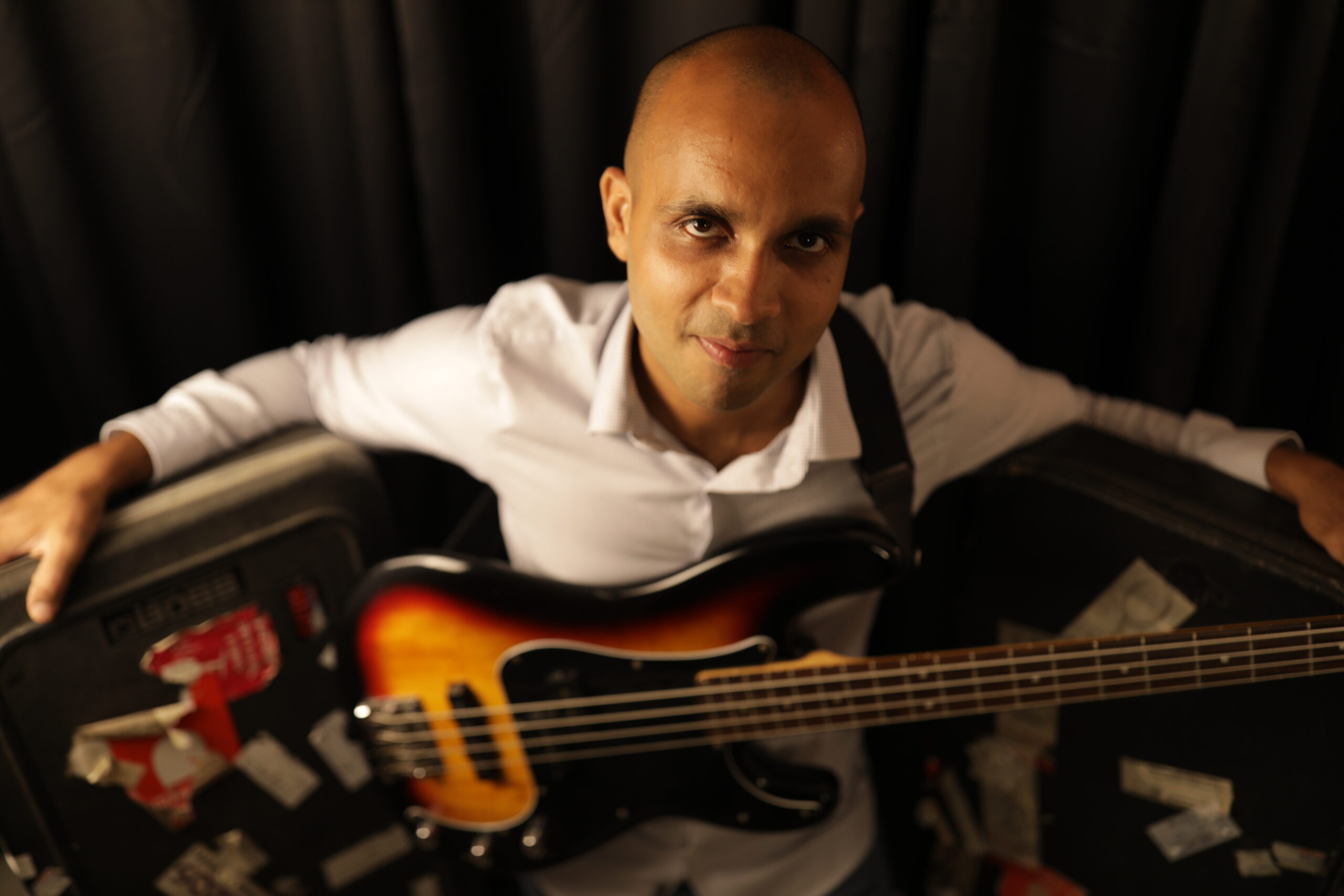
03 Feb In Conversation with: Saurabh Suman
The ‘In Conversation with’ series brings to you the stories of musicians and their musical journeys. Today’s piece features Saurabh Suman.
I first met Saurabh at the Singers Night at the Global Music Institute campus in Lajpat Nagar. His demeanor, presence, and playing just acted as a calming force for anyone that interacted with him. That was my first impression of Saurabh and it still holds true. I recently got on a call with him to catch up and learn about what he’s been upto. For those of you that may not be familiar with him, Saurabh Suman is one of the most sought out bass players in the country. He’s not only involved heavily in the independent music scene in India, but has also worked with bollywood giants like Vishal Bhardwaj, Shaan, Clinton Cerejo, Dhruv Ghanekar, Sandesh Shandilya, Nikhil D’Souza, Shalmali Kholgade, Shefali Alvares, and The Bartender. He has toured and performed live all over the world, and has also been a part of numerous TV shows, namely – MTV Jammin, The Voice, AR Rahman’s show ARRived, MTV Unplugged, and Coke Studio. Along with a Bachelor’s degree in Hindustani Classical Music, Saurabh has spent years studying western musical forms such as jazz, disco, funk, blues, metal, and fusion.
The School of Bass
A couple of years back, I met Saurabh and another friend for a cup of coffee, and being new in the city (Bombay), he was kind enough to give me a lot of information and tips on how to navigate the industry there. He was passionate about sharing whatever he knows, and wanted to offer his learnings from being a part of the music scene for so many years. He has now translated this passion into The School of Bass.
The School of Bass (TSB) is an educational platform that was created by Saurabh Suman and has four main modes of instruction: YouTube Lessons, Vlogs about Professional Life, Podcasts with stalwarts and of course, in-depth courses on their website where musicians can grow their skills in a structured manner. The aim is to develop professional level, practical musicianship amongst bass players across India. It has made learning more accessible for every aspiring bassist in the country as the mode of instruction is Hindi, and today, they have a whopping 13000 subscribers studying on the platform.
“A book changed my life. Like many musicians, I had been teaching and playing for a long time. But these activities had their regular seasonality and I wasn’t seeing the kind of personal, professional or financial growth I wanted. The book ‘Click Millionaires’ reversed the equation for me. It taught me to first be clear about the life I wanted and then back-calculate my professional efforts to lead to this ideal and fulfilling life. The book also introduced me to the concept of niches and this was when I noticed that there was a language barrier in the western music education paradigm. I formed TSB to teach western musical concepts in Hindi,” he explained. As TSB is an online platform, the concepts being relayed had to be broken down in the clearest manner. “This process made me realise that music is much easier than it is often made out to be. The un-complication of music coupled with a love for songs and musicality is what makes my students enjoy their studies and stick with their practice,” he added.
Saurabh has a brilliant growth plan laid out for TSB’s future. He wants to feature as many Indian bass players on the website as possible, so that the students can learn from their local heroes. “There are many greats here and we provide a structure and a platform for their approaches, proficiencies and points of view to be taught.” Along with featuring Indian artists, Saurabh also plans to keep the focus on an India-oriented style of bass playing including the study of ragas, and playing bass to Indian rhythms.
Creating
Like most of the world, having spent the last two years dealing with the pandemic, life as we knew it changed for every performing musician. I asked Saurabh about how he kept himself motivated to create through the adversity:
“I feel that motivation is a bonus, but not a requirement. I create whether or not I am inspired or motivated. I’m just better and more productive on the days I am motivated. But my commitment doesn’t shake on days that I am unmotivated. I do what I need to do every day.”
He went on to talk about another book that really inspired him: ‘The War of Art’ by Steven Pressfield. “In this book, the author talks about how a professional shows up to work every day no matter what the voices in his head say. Whenever you are to create something that will impact your life or the lives of others, there will be resistance and hurdles. But the professional has to show up and motivation often follows once you have made the effort to sit down and do the work,” he added.
We also got a chance to talk about his original ‘Listening to the Green’, that he released in 2018. His intention with that song was to play a duo set up with a drummer. For him, the song is a sonic expression of his drive from a very bustling Bombay only to get onto the beautiful Bombay-Pune Highway that is surrounded by hills and waterfalls. While talking about his style of playing, Saurabh went on to explain, “I just try to transcribe the sound in my head and the feeling in my heart. Those are central. These are the things that create personal style, whether you are an independent artist or a session player. Your taste defines your style.”
Performing & Learning
With years and years of performing experience with independent musicians as well as big bollywood names, Saurabh has a myriad of knowledge about the music industry in India. All experiences are important, regardless of the outcome, as even a bad experience can result in a learning that you may carry with yourself for a long time. So we asked Saurabh to share some of his experiences and learnings over the years. I asked him what he appreciated the most about the industry, and his answer was simple- the existence of certain people. That list includes Aditya Pushkarna, Vasundhara Vee, Dhruv Ghanekar, Vishal and Rekha Bhardwaj, Divya Kumar, Prabhdeep, Sanjay Divecha, and Kaushiki Chakraborty to name a few. He appreciates the honesty and uniqueness of their musical expression- “The music industry is very varied and no matter who you are or where you are from, there is a place and a niche for you in it. This is a plus because it is not restricted to one type of musician, or person – contrary to popular perception.” Another aspect of community building that he focuses on are jam sessions. He views them as an important educational tool as well. He went on to say, “We need to open up the possibility for younger musicians playing with others and playing with better players than themselves. People get work from these interactions. Audiences get built over time. And most of all, the musicians get better. These days, people are learning online and real-world play-time is missing.”
The one thing that he wishes that more artists got involved in and paid attention to is the business of music. “Bombay is an expensive city and I learnt the importance of investing money, saving money, creating emergency funds etc. not only from books but also from the seasoned and hardened professionals I was traveling and working with, who had seen many ups and downs in the music industry,” he added. According to Saurabh, learning about product creation, business, planning, and finances is as important as learning standards and building your repertoire. These factors have a direct bearing on your musical career but are often viewed as the enemy, instead of a contributor.
Saurabh Suman is bringing about a wave of change in the area of music education and that kind of impact will truly shape the future bassists of the country. We can’t wait to experience all that is in store for him, his music, and his projects! Follow Saurabh’s YouTube channel to keep us with his journey.
Written by Charita Arora



No Comments